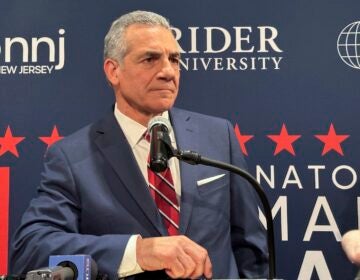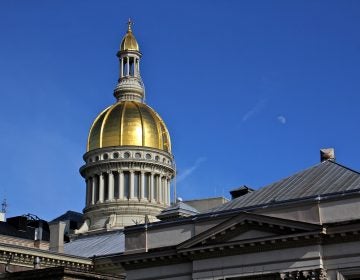Lawmakers propose task force to explore the possibility of reparations for Black N.J. residents
Their proposal comes more than a decade after the Garden State publicly apologized in 2008 for its role in the U.S. slave trade.

Members of the Legislative Black Caucus, Assemblywomen Shavonda Sumter, left and Britnee Timberlake; Sen. Ron Rice is at the podium. (NJ Spotlight)
A group of New Jersey legislators wants to form a task force that would explore the possibility of reparations for African American residents of New Jersey. Their proposal comes more than a decade after the Garden State publicly apologized in 2008 for its role in the Atlantic slave trade.
“Last I checked, where there’s a public admission of guilt, there has to be some type of repair or restitution made,” said Rev. Charles Boyer, pastor of the Bethel AME Church in Woodbury, New Jersey. “That’s what we’re looking for.”
Sponsors of the bill include state Senators Ronald Rice and Sandra B. Cunningham, Assemblywoman Shavonda Sumter, Assemblywoman Britnee Timberlake and the Legislative Black Caucus.
“I believe the country is ready to have a conversation on the history of slavery and racism, giving us a special opportunity … to develop reparations proposals for African Americans in New Jersey,” Rice said.
Legislation in the state Senate and Assembly would create a task force to investigate New Jersey’s historical legacy and its involvement in the slave trade. The task force would then come up with recommendations for reparations.
“Through the creation of this legislation, we hope to restore and repair communities that have been systematically broken,” said Assemblywoman Britnee Timberlake.
“There was, historically, a conversation about 40 acres and a mule, and we know that 40 acres and a mule does not fit into our society anymore,” Timberlake continued. “What does fit into our society is education subsidies or a housing subsidy. In essence, it translates into money.”
Timberlake added that it’s crucial that members of the task force are fairly compensated.
“It would be ironic to put together a commission to explore the ramifications of slavery, which was unpaid labor that built the entire economic system of the United States, for free,” Timberlake said.
Speaking on the possible difficulty of getting buy-in for what could be a costly legislative proposal, Timberlake said, “There is money for things that people want there to be money for.”
WHYY is your source for fact-based, in-depth journalism and information. As a nonprofit organization, we rely on financial support from readers like you. Please give today.




